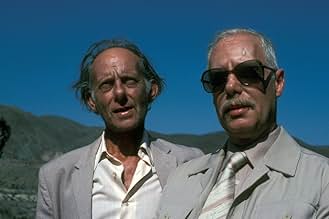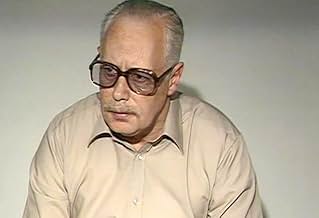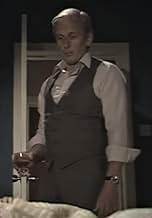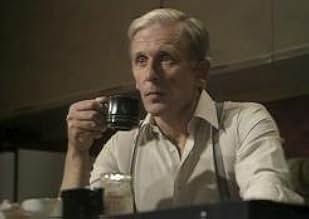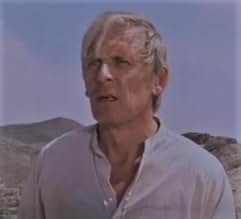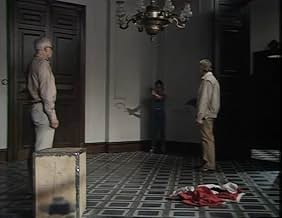अपनी भाषा में प्लॉट जोड़ेंAfter WWII, ex-Gestapo officer Kessler flees as a war criminal, escaping with wealth to Paraguay to start anew as a businessman. He dreams of fascism's return while former Lifeline members h... सभी पढ़ेंAfter WWII, ex-Gestapo officer Kessler flees as a war criminal, escaping with wealth to Paraguay to start anew as a businessman. He dreams of fascism's return while former Lifeline members hunt him.After WWII, ex-Gestapo officer Kessler flees as a war criminal, escaping with wealth to Paraguay to start anew as a businessman. He dreams of fascism's return while former Lifeline members hunt him.
एपिसोड ब्राउज़ करें
फ़ीचर्ड समीक्षाएं
"Kessler" reminded me of a TV adaptation of a Jack Higgins novel. (This might be seen as damning with faint praise.) Three members of "Lifeline" (the Belgian group that helped downed Allied flyers), appear only in the first episode, then the series shows an underwhelming West German security agent and an Israeli girl (played by a future Playboy model) tracking Kessler to South America where he meets other Nazis - the Kameradenwerk. At the inevitable confrontation, there's a prolonged debate about Kessler's philosophy and actions, during which the agent exclaims "words, just words; people are sick and tired of them", which prompted me to agree, so drawn out was the discussion.
With a cast comprising mainly C list actors, it's not difficult for Clifford Rose's performance to stand out. For nearly all the time he wears large-framed spectacles that obscure much of his face, and on the odd occasion when he removes them his face does not appear to have aged as much as the series' timeline might call for, but his movements are convincingly those of an old man. (He himself was then in his very early fifties.) He portrays a wide range of emotions: love for his dead wife (Madeleine) and his daughter, revulsion for the human experiments carried out by some of the Kameradenwerk, nostalgia for the Third Reich and dreams of a Fourth Reich.
With a cast comprising mainly C list actors, it's not difficult for Clifford Rose's performance to stand out. For nearly all the time he wears large-framed spectacles that obscure much of his face, and on the odd occasion when he removes them his face does not appear to have aged as much as the series' timeline might call for, but his movements are convincingly those of an old man. (He himself was then in his very early fifties.) He portrays a wide range of emotions: love for his dead wife (Madeleine) and his daughter, revulsion for the human experiments carried out by some of the Kameradenwerk, nostalgia for the Third Reich and dreams of a Fourth Reich.
Not really a sequel to Secret Army, despite the brief appearances of Monique, Albert and Natalie, all of whom are wasted in the first episode. Hopes are raised that they will have a major part to play but these are soon dashed. Kessler himself seems less menacing if still unsympathetic but suffers from the lack of interplay and rivalry with his Luftwaffe counterparts. His rise in the Nazi hierarchy is unconvincing. He still has a pretty boy assistant now in a three piece suit rather than SS uniform though Franz is nastier, more ambitious and devious than his two predecessors. Kessler's daughter Ingrid does not have the humanising effect of her mother Madeleine but is a caricature of a neo Nazi madchen. The Nazi hunters lack depth and the ageing Nazis are stereotypes. The pace, characterisation, dramatic structure, tension and atmosphere are all inferior to Secret Army. All told a disappointment unworthy of its inspiration, it would have been better if there were no link with Secret Army.
However, would he have really made a fresh start in Germany rather than flee to South America?
A Belgian journalist sets the wheels in motion, in a bid to hunt down former Nazi officer, Ludwig Kessler, who's now living a successful new life, with a new name.
It's definitely an interesting storyline, a group of fanatics still desperate to see Hitler's plans put into action, a network exposed.
The chances are you'll have come here from The Secret Army, hoping for an extension of that great series, and a continuation of that same quality, unfortunately Kessler doesn't quite hit those levels.
It's a bit of a clunky production, it doesn't move at pace, it doesn't really spark into life until later on in the series, the first trio of episodes are actually slow moving.
Initially you'll wonder if the budget was quite small, but it soon becomes apparent that it was used for the location work, and it's fair to say there is a great variety, it never feels studio bound.
The acting, for me this was the stumbling block, Clifford Rose was pretty good as the titled character, I found his character quite well rounded and sincere, the supporting cast however, some of the acting was flat, with blank characters, I never felt like I understood why Rak and Bauer were so heavily involved.
I've tried a few times to watch it, but always quit after episode two or three, I'm glad I persisted this time, as it does improve towards the end, sadly the first half of the series is just so dull.
6/10.
It's definitely an interesting storyline, a group of fanatics still desperate to see Hitler's plans put into action, a network exposed.
The chances are you'll have come here from The Secret Army, hoping for an extension of that great series, and a continuation of that same quality, unfortunately Kessler doesn't quite hit those levels.
It's a bit of a clunky production, it doesn't move at pace, it doesn't really spark into life until later on in the series, the first trio of episodes are actually slow moving.
Initially you'll wonder if the budget was quite small, but it soon becomes apparent that it was used for the location work, and it's fair to say there is a great variety, it never feels studio bound.
The acting, for me this was the stumbling block, Clifford Rose was pretty good as the titled character, I found his character quite well rounded and sincere, the supporting cast however, some of the acting was flat, with blank characters, I never felt like I understood why Rak and Bauer were so heavily involved.
I've tried a few times to watch it, but always quit after episode two or three, I'm glad I persisted this time, as it does improve towards the end, sadly the first half of the series is just so dull.
6/10.
The creators of this series originally intended to set it in an earlier decade - the 1960's - but the BBC objected on the grounds that this would cost more than a contemporary setting. The writers were told that it was deemed too expensive to hire 'period-appropriate' clothes, cars, props and locations; when they pointed out that the Kessler character would be quite ancient by the dawn of the 1980's (not to mention further removed from the events of "Secret Army"), the BBC executives apparently replied:"who cares, nobody will notice". Thus the cast and those behind the camera began the project with legitimate misgivings.
In "Secret Army", Kessler had a romantic relationship which made the character three dimensional and showed that even a cruel Nazi bigot had human dimensions. At the time, some people at the BBC felt that this factor might inspire too much sympathy for Kessler. Perhaps the Corporation's fear of the SS man being hero-worshipped explains why his loving companion makes no appearance in the subsequent series?
In "Secret Army", Kessler had a romantic relationship which made the character three dimensional and showed that even a cruel Nazi bigot had human dimensions. At the time, some people at the BBC felt that this factor might inspire too much sympathy for Kessler. Perhaps the Corporation's fear of the SS man being hero-worshipped explains why his loving companion makes no appearance in the subsequent series?
क्या आपको पता है
- ट्रिवियाThe serial incorporates several elements of What Did You Do in the War, Daddy? (1979), the never aired final episode of Secret Army (1977) which was also written by John Brason: Kessler married his Belgian mistress Madeleine Duclos, who has since died, and has established himself as a major industrialist in West Germany under the pseudonym Manfred Dorf, Monique has a son in his twenties and returns to Brussels for the first time since the end of the war, Albert still owns the Candide in addition to six other restaurants and the surviving members of Lifeline reunite for the purposes of a documentary series entitled "In Our Time" which attempts to expose Kessler as a Nazi war criminal.
- क्रेज़ी क्रेडिटThe opening titles start by displaying the letters SS which change to the name Kessler.
- कनेक्शनFollows Secret Army (1977)
टॉप पसंद
रेटिंग देने के लिए साइन-इन करें और वैयक्तिकृत सुझावों के लिए वॉचलिस्ट करें
- How many seasons does Kessler have?Alexa द्वारा संचालित
विवरण
इस पेज में योगदान दें
किसी बदलाव का सुझाव दें या अनुपलब्ध कॉन्टेंट जोड़ें

